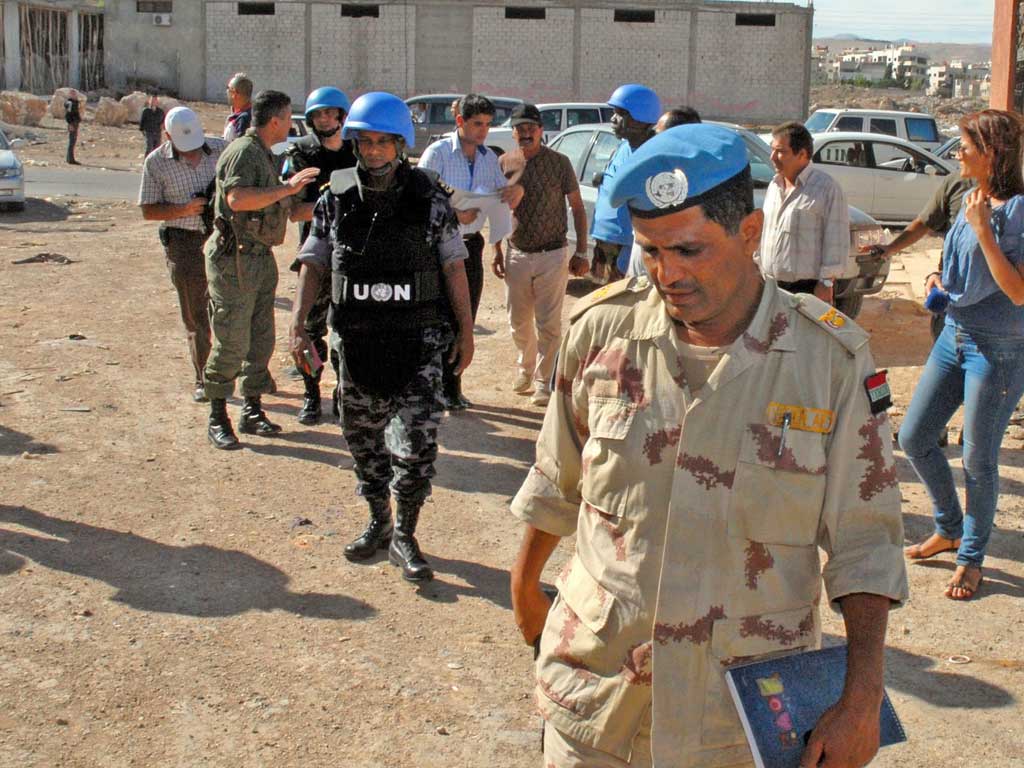Assad regime blames murderous onslaught on Houla's rebel army for slaughter of children of Houla

Your support helps us to tell the story
From reproductive rights to climate change to Big Tech, The Independent is on the ground when the story is developing. Whether it's investigating the financials of Elon Musk's pro-Trump PAC or producing our latest documentary, 'The A Word', which shines a light on the American women fighting for reproductive rights, we know how important it is to parse out the facts from the messaging.
At such a critical moment in US history, we need reporters on the ground. Your donation allows us to keep sending journalists to speak to both sides of the story.
The Independent is trusted by Americans across the entire political spectrum. And unlike many other quality news outlets, we choose not to lock Americans out of our reporting and analysis with paywalls. We believe quality journalism should be available to everyone, paid for by those who can afford it.
Your support makes all the difference.Syria yesterday denied that its forces had carried out a massacre of at least 116 people including dozens of children in the central Syrian town of Houla, claiming that the slaughter was the work of rebels.
But it did not give a detailed account of what had happened that would convincingly refute allegations by insurgents, largely supported by UN monitors, that military units and militia men loyal to the government had carried out the killings.
Sources in Damascus told The Independent yesterday that they believed the attack had been carried out by regime forces in revenge for the killing of a government informant in the nearby Alawite village of Kabou a month earlier.
The claims and counterclaims came as shelling of neighbourhoods in the central Syrian city of Hama, the rebel-held town of Rastan north of Homs, and areas of the Damascus suburbs were reported by the Local Coordination Committees and the Syrian Observatory for Human Rights, which is based in Britain.
The government in Damascus yesterday appeared to be somewhat leaderless and seemed slow to take on board the impact of an outrage in which people across the world are blaming the Syrian authorities for the murder and mutilation of children. "I get the impression that there is nobody in firm control of Syrian policy and the Syrian armed forces," said a diplomat yesterday.
The Syrian government is claiming that the massacre happened after 100 heavily armed men attacked government checkpoints around Houla early on Saturday morning and then butchered the inhabitants of Houla over a nine-hour period. Blaming "terrorists" for the massacre, Foreign Ministry spokesman Jihad Makdissi told reporters in Damascus that "women, children and old men were shot dead. This is not the hallmark of the heroic Syrian army."
The opposition gave a more detailed account of what happened, saying that Houla was first shelled on Thursday after street protests by villagers. This has been confirmed by UN ceasefire monitors, who later found large-calibre shell casing. Anti-government militants say that "shabibah" militia men from the Alawite community loyal to President Bashar al-Assad entered Houla and hacked or shot its people to death.
An opposition eyewitness, named by news agencies as Maysara al-Alhawi, said he saw the bodies of six children and their parents in a looted house in the town.
He told a news agency: "The children's corpses were piled on top of each other, either with their throats cut or shot at close range.
"I helped collect more than 100 bodies in the last two days, mostly women and children. The last were six members of the al-Kurdi family. A father and his five kids. The mother is missing," he said.
Alawite villagers in the area of Houla were said to be frightened of retaliation for the massacre and have been donating blood for the wounded, the number of which is believed to be between 300-400.
Join our commenting forum
Join thought-provoking conversations, follow other Independent readers and see their replies
Comments